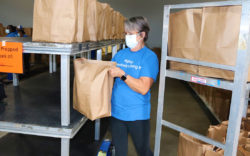Candidates disagreed on health care, taxes, immigration and more at a recent forum at Piedmont Athens Regional, sponsored by the Athens and Oconee County chambers of commerce.
In the Senate District 47 section, Democrat Dawn Johnson gave a fact-rich and perhaps bleak description of the issues facing Georgia: “Georgia is No. 1 for maternal mortality, No. 7 for infant mortality. In fact, it’s safer to have a baby in Iraq… Two babies die every day in Georgia. We’re 10th in the nation for poverty, and we rank 50th for access to health care and amount invested in infrastructure.
“Georgia has been trending downward because we have not been focusing on citizens,” she said. “We are focusing on corporations, and that has not translated into success for Georgians.”
When asked how she planned to pay for her programs, Johnson responded by questioning the value of hundreds of millions of dollars in state tax incentives. “Do [these incentives] cost the state more money than we receive?” she asked. “We have a $300 million tax cut to the insurance industry, but our auto insurance [rates are] 55 percent higher than other states.”
Sen. Frank Ginn (R-Danielsville) responded by calling for low taxes for individuals, but he failed to address Johnson’s point about tax breaks. “Everybody in here has a wallet or a billfold. It’s your money that’s in that wallet or billfold,” he said. “I want to make sure that I work so that you make decisions on how you want to spend your money.”
Cowsert did not attend a forum earlier this month at Piedmont Athens Regional sponsored by the Athens and Oconee County chambers of commerce, but Wiedower, Gaines, Ginn and Johnson did. They answered questions about health care and other issues in front of about 200 people.
Sen. Bill Cowsert’s absence—the lawyer was at a deposition—made for a fairly lopsided debate, as Democrat Marisue Hilliard pretty much agreed with write-in Green Party candidate John Fortuin.
Hilliard referred to the 2017 state income tax cut as “penny wise and pound foolish,” saying it would cost the state $3.6 billion that “could have put to much better use.” Fortuin upped Hilliard’s ante and said that “high-income Georgians need to pay their dues by paying taxes.”
Next came House District 117. Republican Houston Gaines introduced himself as a “third-generation Athenian,” presumably in contrast to Rep. Deborah Gonzalez (D-Athens), a New Jersey native. Gonzalez emphasized her upbringing in a military family, working since she was a teenager and raising two children as a single mother.
Gaines said he is opposed to accepting federal funds to expand Medicaid, citing the cost. In contrast to Cowsert’s assertion that the state has raised reimbursement rates up to the national average, Gaines claimed many doctors won’t take Medicaid, so putting more people on it would be pointless. Gonzalez countered that Georgia has left $8 million on the table every day since the Affordable Care Act became law.
Gaines said he opposes undocumented immigrants getting the HOPE scholarship or even in-state tuition.
“There are two ways you can look at economics,” Gonzalez replied. “Either you have one pie and that’s all you have, and if I take more then you can’t have it, or you can look at it as a pie that actually gets bigger the more people that become a part of what’s going on.”
Both candidates agreed on restoring means testing for HOPE scholarship recipients, making the popular program available to more middle- and lower-income families.
The House District 119 segment, coming at the end, trod familiar ground and was cut short for time. Rep. Jonathan Wallace (D-Watkinsville) brought his technology background to bear on the topic of voting machines and the security of Georgia’s entire election database.
“The issue we have right now [with electronic voting machines] is without paper ballots, we can’t check the votes,” he said. DREs “are inherently insecure, and when they are programmed, they can be programmed with viruses that can be undetectable.”
Republican Marcus Wiedower countered, “Clearly, these machines have to be updated. But living in the year we are living in, paper ballots seem extremely inefficient.”
On unemployment, Wallace said, “I’ve been working in the area of tech for 20 years, and we have a negative 2 percent unemployment in software technology. That’s [expertise] I’d like to continue to bring to the state capital.”
Wallace co-sponsored a bill with Gonzalez last year to expand Medicaid. “Health care is the No. 1 issue for everyone I’ve spoken to while knocking on doors,” he said.
Wiedower proposed that the state “get creative. We need to consider direct-to-patient billing,” he said, and sidestep the issue of insurance and Medicaid by “incentivizing doctors” to treat the uninsured.
Like what you just read? Support Flagpole by making a donation today. Every dollar you give helps fund our ongoing mission to provide Athens with quality, independent journalism.










